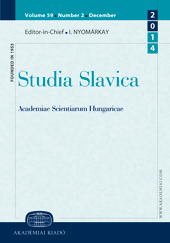Factuality, Fictionality, and Self-Referentiality in the Context of Intertextual Poetics
Factuality, Fictionality, and Self-Referentiality in the Context of Intertextual Poetics
J. M. Coetzee’s The Master of Petersburg reading F. M. Dostoevsky’s work and life
Author(s): Katalin KroóSubject(s): Semiotics / Semiology, Poetry, Semantics, Philosophy of Language, Hermeneutics
Published by: Akadémiai Kiadó
Keywords: Coetzee; The Master of Petersburg; Dostoevsky; factuality–fictionality; self-reflexiveness; self-referentiality; intertextuality;
Summary/Abstract: The paper approaches the aspects of factuality and fictionality first in the context of intertextuality. Intertextuality is conceived, on the one hand, as a poetic device for the accentuation and the semantic evaluation of the factual within a “fictional” world (plot) created by literary discourse engendering an entire semantic universe. On the other hand, intertextuality is regarded as a tool for the semantic transposition of referentiality in the literary text into a self-reflexive mode of discourse evolution, integrating the text’s self-definition from a cultural historical point of view. In a wider sense, self-referentiality links the domains of the intratextual and the intertextual, explaining the phenomenon of historicity through poetic discourse, in a way which can be interpreted from a semiotic point of view. When in a process of semiotic reading, the literary text is conceptualised as a complex semiotic system revealing itself in its dynamic development, it is possible to differentiate various theoretical and methodological approaches to the correlation of the key concepts of factuality, fictionality, and self-referentiality ([self-]reflexivity).
Journal: Studia Slavica Academiae Scientiarum Hungaricae
- Issue Year: 62/2017
- Issue No: 1
- Page Range: 115-133
- Page Count: 19
- Language: English
- Content File-PDF

